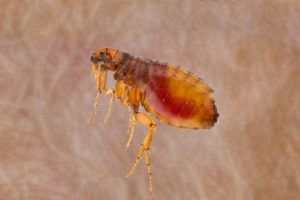 Flea infestation can occur at any time at all but mostly in the warm and convenient times of summer. That warm weather and those blue skies bring something with them a habitat for these fleas. They’re a menace to our dogs’ comfort and can wreak havoc on our homes. You know that they’re annoying, frustrating, painful, and extremely hard to get rid of. But did you know that fleas also pose huge health risks?
Flea infestation can occur at any time at all but mostly in the warm and convenient times of summer. That warm weather and those blue skies bring something with them a habitat for these fleas. They’re a menace to our dogs’ comfort and can wreak havoc on our homes. You know that they’re annoying, frustrating, painful, and extremely hard to get rid of. But did you know that fleas also pose huge health risks?
Fleas attack pets more than humans; there are a large percentage of dogs that are allergic to the saliva of fleas. When bitten by a flea, instead of simply scratching the area to relieve the annoying itch – a dog with Flea Allergy Dermatitis will dig at, lick, bite and chew the area which has more than likely already welted and is highly irritated. This can result in excessive shedding of fur, painful skin problems, and infection.
Here’s something that a lot of owners of dogs and puppies have no idea about. Fleas are parasite carriers! (And not just any parasite- the Tapeworm parasite). Infected fleas – as they scurry through your dog’s fur, run laps on his skin, and sink their little teeth in to cause itching – are then ingested by your dog or puppy as they groom themselves. A Tapeworm infection is no laughing matter either! If you notice your puppy is lethargic, losing weight, vomiting, has diarrhea, and just all around isn’t looking right, you’ll want to get him to the vet as soon as possible. Tapeworm eggs will be passed through his feces and into your yard where he ‘does his business’ so can easily be transmitted to you or your children if not taken care of right away! In the more rare instances, fleas can also be carriers of some awfully terrible diseases such as typhoid and plague. The presence of these little devils certainly shouldn’t be taken lightly!
Please help ensure your pet or little guy or girl stays flea-free by making an appointment with your vet right away and beginning routine treatment of a flea and tick preventative such as Frontline, Advantage or K-9 Advantix.
For humans, flea bites do not come with a lot of drama and may only require some light treatment to get over the inconvenience. A mere cortisone cream or antibiotic ointment should do, and treatment should be immediate as respiratory trouble can also rear its head here.
Their life span is something to be joyful about; on a short haired dog they can last just about eight (8) days, and on a host with longer furs they can stretch the number to as much as two weeks. Like every other organism they require nutrients to survive and most times they don’t readily get them from the host as the host is always going to be busy trying to get them off him or her.
Every insect bite is a big deal, so do well to be safe from fleas and their karma by keeping the place flea-free and taking preventive medication.

